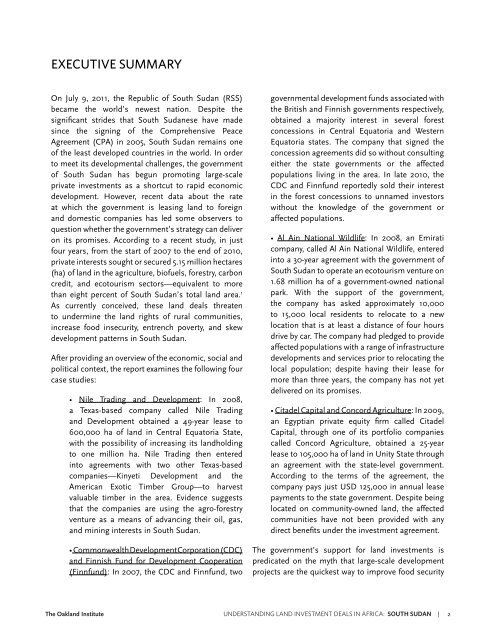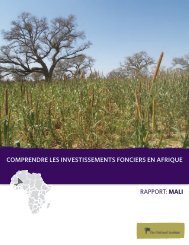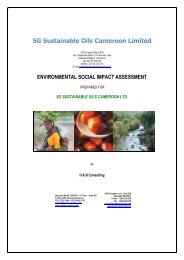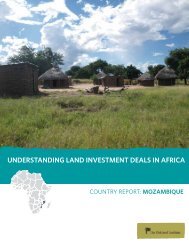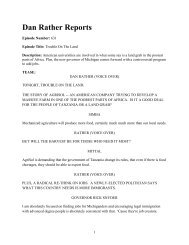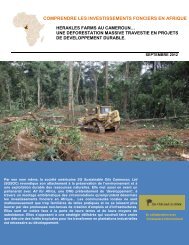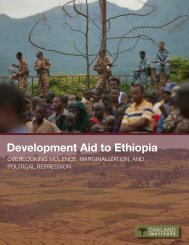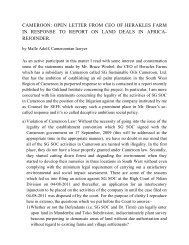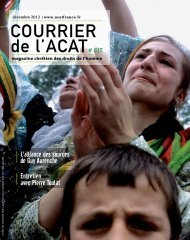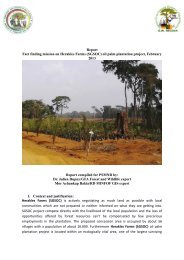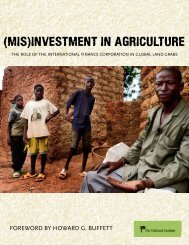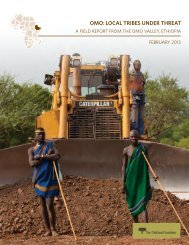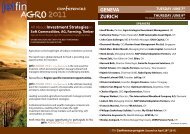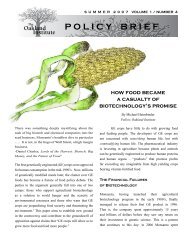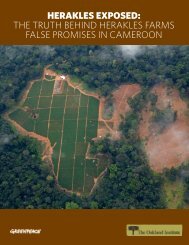understanding land investment deals in africa - Oakland Institute
understanding land investment deals in africa - Oakland Institute
understanding land investment deals in africa - Oakland Institute
- No tags were found...
You also want an ePaper? Increase the reach of your titles
YUMPU automatically turns print PDFs into web optimized ePapers that Google loves.
executive summaryOn July 9, 2011, the Republic of South Sudan (RSS)became the world’s newest nation. Despite thesignificant strides that South Sudanese have mades<strong>in</strong>ce the sign<strong>in</strong>g of the Comprehensive PeaceAgreement (CPA) <strong>in</strong> 2005, South Sudan rema<strong>in</strong>s oneof the least developed countries <strong>in</strong> the world. In orderto meet its developmental challenges, the governmentof South Sudan has begun promot<strong>in</strong>g large-scaleprivate <strong><strong>in</strong>vestment</strong>s as a shortcut to rapid economicdevelopment. However, recent data about the rateat which the government is leas<strong>in</strong>g <strong>land</strong> to foreignand domestic companies has led some observers toquestion whether the government’s strategy can deliveron its promises. Accord<strong>in</strong>g to a recent study, <strong>in</strong> justfour years, from the start of 2007 to the end of 2010,private <strong>in</strong>terests sought or secured 5.15 million hectares(ha) of <strong>land</strong> <strong>in</strong> the agriculture, biofuels, forestry, carboncredit, and ecotourism sectors—equivalent to morethan eight percent of South Sudan’s total <strong>land</strong> area. 1As currently conceived, these <strong>land</strong> <strong>deals</strong> threatento underm<strong>in</strong>e the <strong>land</strong> rights of rural communities,<strong>in</strong>crease food <strong>in</strong>security, entrench poverty, and skewdevelopment patterns <strong>in</strong> South Sudan.After provid<strong>in</strong>g an overview of the economic, social andpolitical context, the report exam<strong>in</strong>es the follow<strong>in</strong>g fourcase studies:• Nile Trad<strong>in</strong>g and Development: In 2008,a Texas-based company called Nile Trad<strong>in</strong>gand Development obta<strong>in</strong>ed a 49-year lease to600,000 ha of <strong>land</strong> <strong>in</strong> Central Equatoria State,with the possibility of <strong>in</strong>creas<strong>in</strong>g its <strong>land</strong>hold<strong>in</strong>gto one million ha. Nile Trad<strong>in</strong>g then entered<strong>in</strong>to agreements with two other Texas-basedcompanies—K<strong>in</strong>yeti Development and theAmerican Exotic Timber Group—to harvestvaluable timber <strong>in</strong> the area. Evidence suggeststhat the companies are us<strong>in</strong>g the agro-forestryventure as a means of advanc<strong>in</strong>g their oil, gas,and m<strong>in</strong><strong>in</strong>g <strong>in</strong>terests <strong>in</strong> South Sudan.• Commonwealth Development Corporation (CDC)and F<strong>in</strong>nish Fund for Development Cooperation(F<strong>in</strong>nfund): In 2007, the CDC and F<strong>in</strong>nfund, twogovernmental development funds associated withthe British and F<strong>in</strong>nish governments respectively,obta<strong>in</strong>ed a majority <strong>in</strong>terest <strong>in</strong> several forestconcessions <strong>in</strong> Central Equatoria and WesternEquatoria states. The company that signed theconcession agreements did so without consult<strong>in</strong>geither the state governments or the affectedpopulations liv<strong>in</strong>g <strong>in</strong> the area. In late 2010, theCDC and F<strong>in</strong>nfund reportedly sold their <strong>in</strong>terest<strong>in</strong> the forest concessions to unnamed <strong>in</strong>vestorswithout the knowledge of the government oraffected populations.• Al A<strong>in</strong> National Wildlife: In 2008, an Emiraticompany, called Al A<strong>in</strong> National Wildlife, entered<strong>in</strong>to a 30-year agreement with the government ofSouth Sudan to operate an ecotourism venture on1.68 million ha of a government-owned nationalpark. With the support of the government,the company has asked approximately 10,000to 15,000 local residents to relocate to a newlocation that is at least a distance of four hoursdrive by car. The company had pledged to provideaffected populations with a range of <strong>in</strong>frastructuredevelopments and services prior to relocat<strong>in</strong>g thelocal population; despite hav<strong>in</strong>g their lease formore than three years, the company has not yetdelivered on its promises.• Citadel Capital and Concord Agriculture: In 2009,an Egyptian private equity firm called CitadelCapital, through one of its portfolio companiescalled Concord Agriculture, obta<strong>in</strong>ed a 25-yearlease to 105,000 ha of <strong>land</strong> <strong>in</strong> Unity State throughan agreement with the state-level government.Accord<strong>in</strong>g to the terms of the agreement, thecompany pays just USD 125,000 <strong>in</strong> annual leasepayments to the state government. Despite be<strong>in</strong>glocated on community-owned <strong>land</strong>, the affectedcommunities have not been provided with anydirect benefits under the <strong><strong>in</strong>vestment</strong> agreement.The government’s support for <strong>land</strong> <strong><strong>in</strong>vestment</strong>s ispredicated on the myth that large-scale developmentprojects are the quickest way to improve food securityThe Oak<strong>land</strong> <strong>Institute</strong> <strong>understand<strong>in</strong>g</strong> <strong>land</strong> <strong><strong>in</strong>vestment</strong> <strong>deals</strong> <strong>in</strong> <strong>africa</strong>: south sudan | 2


